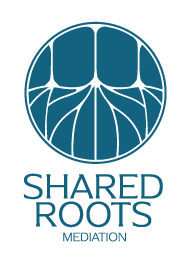How is mediation different from restorative justice/transformative justice processes?
Mediation refers to a specific dispute resolution practice, which may also be used as part of a restorative justice or transformation justice process if deemed appropriate by those involved. You may be most familiar with the facilitative mediation process, in which the mediator - a neutral third party - assists the parties in the dispute through a negotiation to reach a mutually agreeable resolution. By asking questions, validating parties’ positions, and encouraging openness and honesty in joint sessions and separate party “caucuses”, the mediator seeks to identify the interests and needs of each party that may offer options for a resolution. While it may vary from mediator to mediator, facilitative mediation follows a specific process with little variation between particular disputes.
At Shared Roots Mediation, we will incorporate or use solely facilitative mediation if requested by the parties to a dispute. But we also seek to include the principles and practices of restorative and transformative justice as often as we can. In this way, we encourage parties to think beyond a particular conflict to examine the larger context involved in the dispute and how a resolution can address this context and possibly create space for social change.

